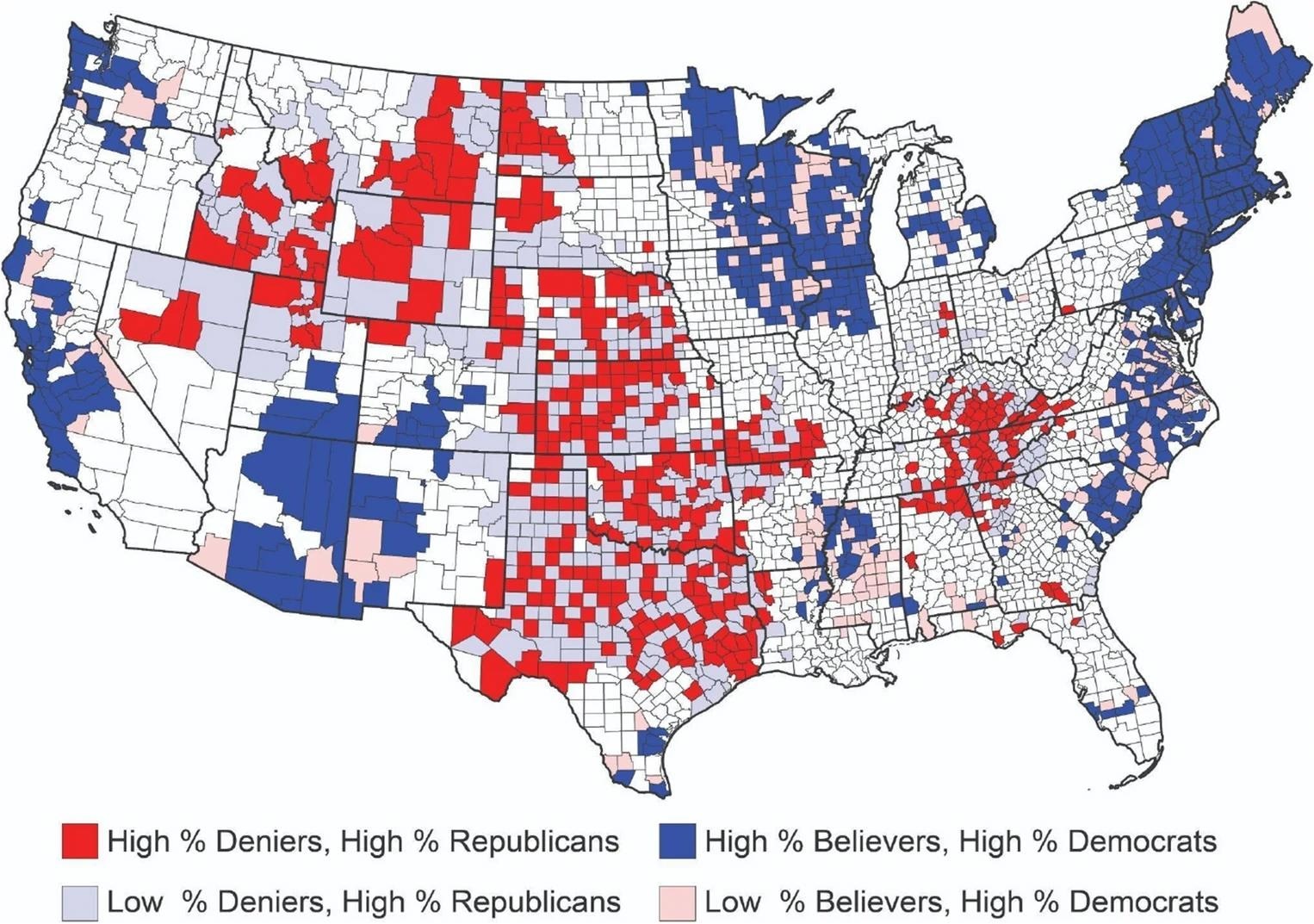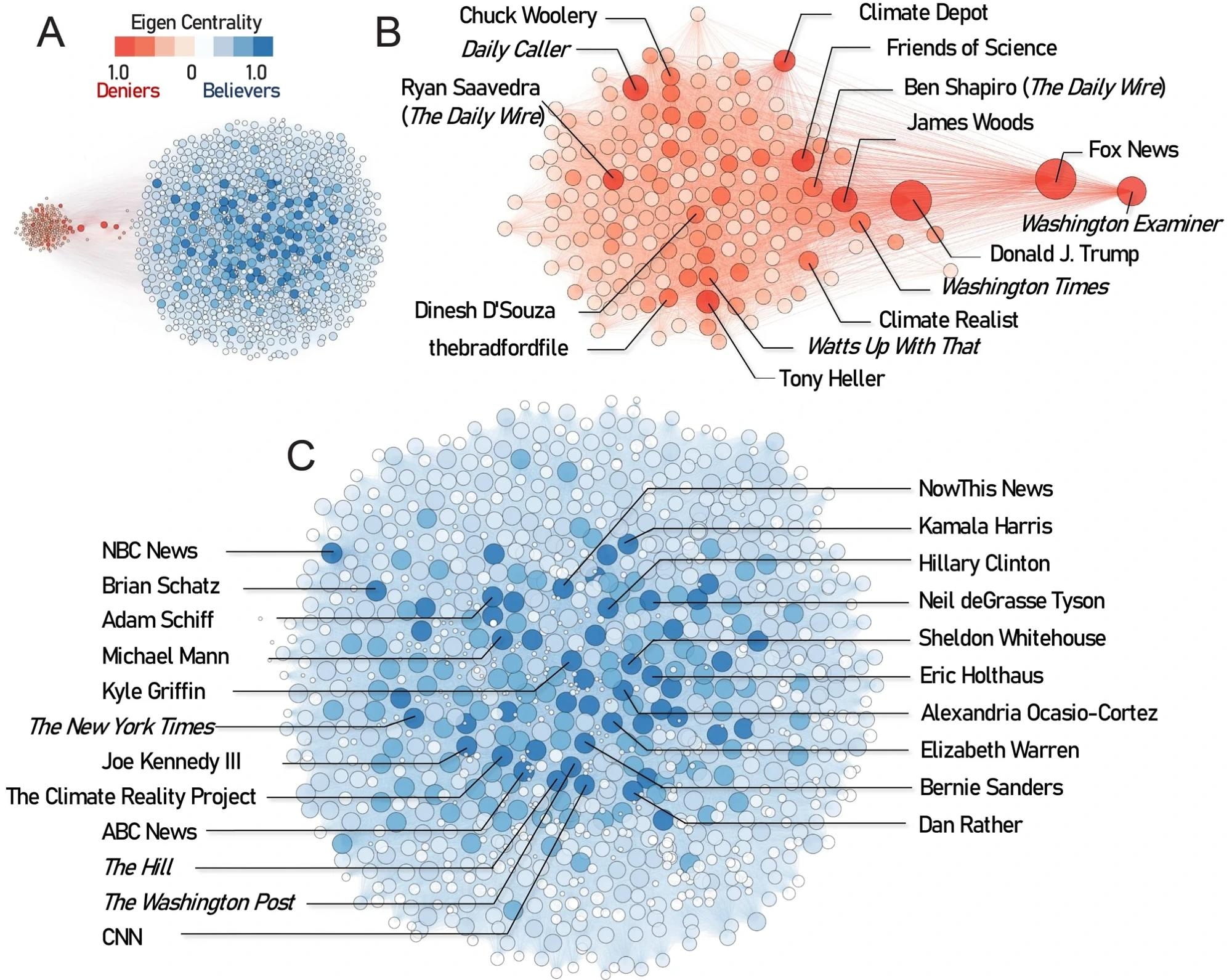Scientists at the University of Michigan, USA, have profiled climate change denialism across the United States using artificial intelligence and network analysis. They find that a large proportion of Americans do not believe in climate change.
The recent prevalence of climate change denialism in the United States is 12% to 26%. The prevalence is higher in regions with high fossil fuel dependency, in rural communities, and in populations with marked disbelief in science. The main reasons behind climate change denialism include political affiliation and ideology, socioeconomic status, educational background, and exposure to extreme weather conditions.
Social media platforms play a significant role in influencing the beliefs and opinions of their users. Influencers often consider these platforms to spread misleading information to millions of users. The Yale Climate Opinion Survey is the only dataset that combines data from more than 2500 national surveys and estimates climate change-related public opinion at the state and national levels for the entire United States.
In this study, scientists have used data from the social media platform Twitter to estimate the prevalence of climate change denialism at the state- and county levels. Twitter is an extensive data source that helps understand public opinion on various topics, including politics, social issues, and the coronavirus disease 2019 (COVID-19) vaccination rate.
 Clusters of spatial association between climate change denial and belief in relation to political affiliation. Notes: Figure created using QGIS 3.30 (https://www.qgis.org/). Spatial clustering analysis performed using Geoda 1.22 (https://github.com/GeoDaCenter/geoda/).
Clusters of spatial association between climate change denial and belief in relation to political affiliation. Notes: Figure created using QGIS 3.30 (https://www.qgis.org/). Spatial clustering analysis performed using Geoda 1.22 (https://github.com/GeoDaCenter/geoda/).
Study design
The scientists used a Deep Learning text recognition model to classify 7.4 million tweets containing climate change-related keywords, which 1.3 million unique US-based users posted between September 2017 and May 2019. The classification led to the identification of climate change believers and deniers.
Besides profiling climate change deniers across the United States, the scientists explored how social media propagates climate change denialism through key influencers and determined how world events are utilized to propagate climate change views.
Important observations
Twitter data analysis revealed that about 14.8% of Americans do not believe in climate change. The highest prevalence of denialism was noticed in the Central and Southern US. In contrast, the highest belief in climate change was observed on the West and East coasts and in New England.
A significant variation in climate change denial was observed within states. Although a significant proportion of the California population believed in climate change, a high prevalence (52%) of climate change denial was observed in Shasta County. In Texas, the prevalence of denialism was 21%; however, in Travis County and Hockley County, the respective prevalence was 13% and 67%.
Regarding the characteristics of climate change deniers, the study found that Republican voters have the strongest negative opinion for climate change both at the state and county levels. In contrast, climate change denialism showed the strongest negative correlation with educational level and COVID-19 vaccination rate. The vaccination rate was used as a proxy measure for belief in science in general.
With further statistical analysis, scientists determined a typical profile of a climate change denier. The profile was defined as a Republican without a college degree and COVID-19 vaccination who lives in a region with high annual temperature.
Climate change influencers on Twitter
The study identified former US President Donald Trump as the most significant influencer for climate change deniers. Three groups of influential deniers showed strong connections with Donald Trump. These groups were conservative media outlets that regularly present negative views on climate change, websites that publish misleading or false information about climate change, and right-wing producers, political commentators, and activists.
 Influencers detected in climate change co-retweeted networks. (A) Co-retweeted networks formed by the 1200 most retweeted users in the U.S. The nodes represent unique accounts; the edges represent co-retweeted relationships. The size of nodes and the shade of the node color are proportional to their influence, as measured by eigenvector centrality scores. The high density of edges within the communities makes many individual edges not displayable. The top influencers in the community of climate change deniers (B) and believers (C) are labeled with the usernames. In panels (B) and (C), edges-to-users in the other community are not displayed.
Influencers detected in climate change co-retweeted networks. (A) Co-retweeted networks formed by the 1200 most retweeted users in the U.S. The nodes represent unique accounts; the edges represent co-retweeted relationships. The size of nodes and the shade of the node color are proportional to their influence, as measured by eigenvector centrality scores. The high density of edges within the communities makes many individual edges not displayable. The top influencers in the community of climate change deniers (B) and believers (C) are labeled with the usernames. In panels (B) and (C), edges-to-users in the other community are not displayed.
For climate change believers, the most common influencers were members of the Democratic Party, popular media outlets or websites, popular science communicators, and entertainers advocating scientific consensus.
Further analysis revealed that a coordinated social media network uses periodic events to spread negative views on climate change and science in general. Six such events were identified, related to extreme cold weather events, climate change activities by the United Nations (UN), and an attack on climate change deniers by Bill Nye in an HBO broadcast.
Study significance
The study finds that about 15% of Americans do not believe in climate change. Political affiliation is the strongest influencing factor towards climate change denialism, followed by educational level, distrust in science, socioeconomic status, and carbon intensity of the regional economy. Social media is the primary platform for spreading negative views on climate change.
Given the study findings, scientists advise social media companies to flag accounts that spread misleading or false information. Instead, the companies should collaborate on targeted educational campaigns to increase public awareness about the detrimental effects of climate change on human, animal, and planetary health.